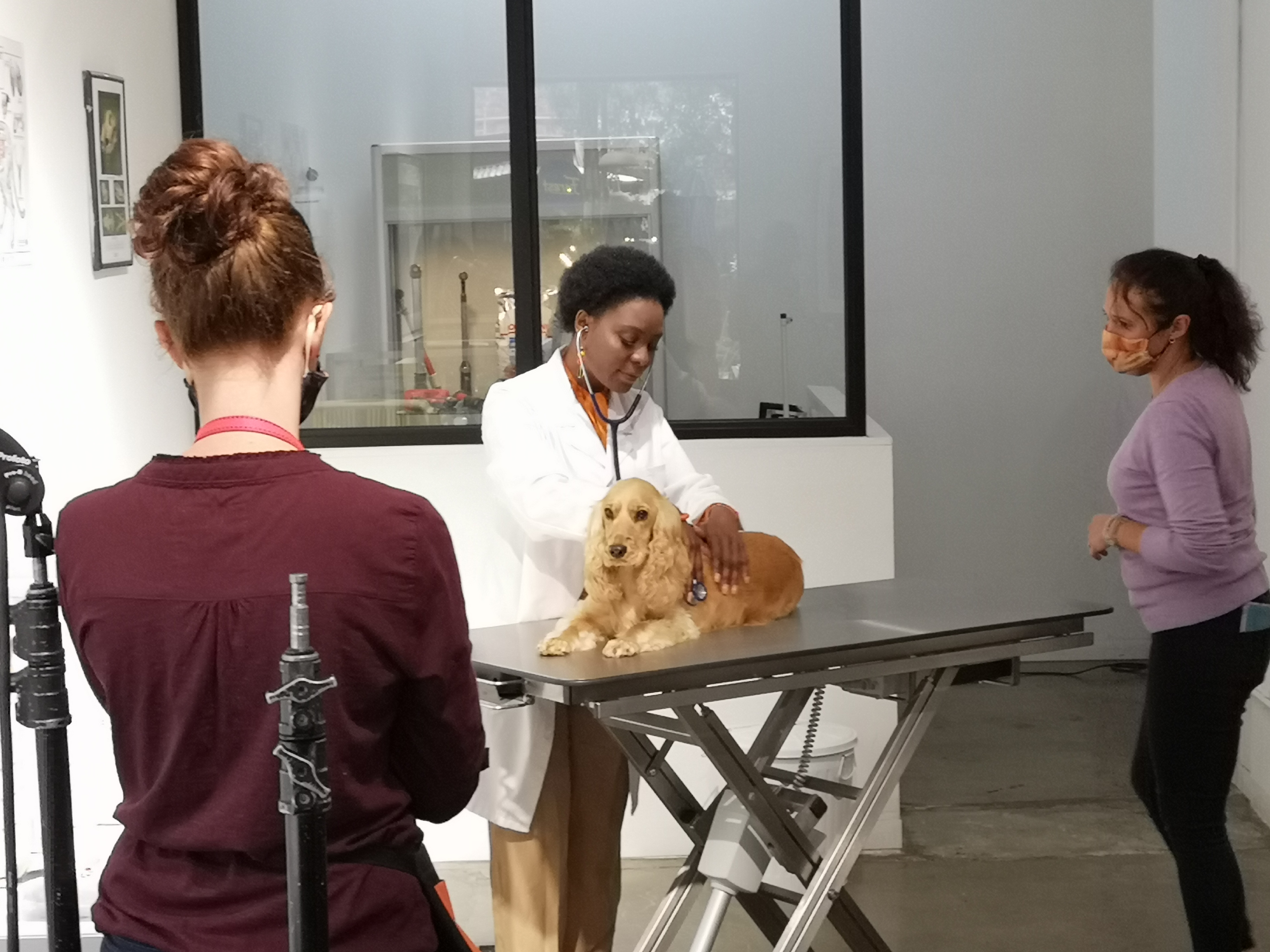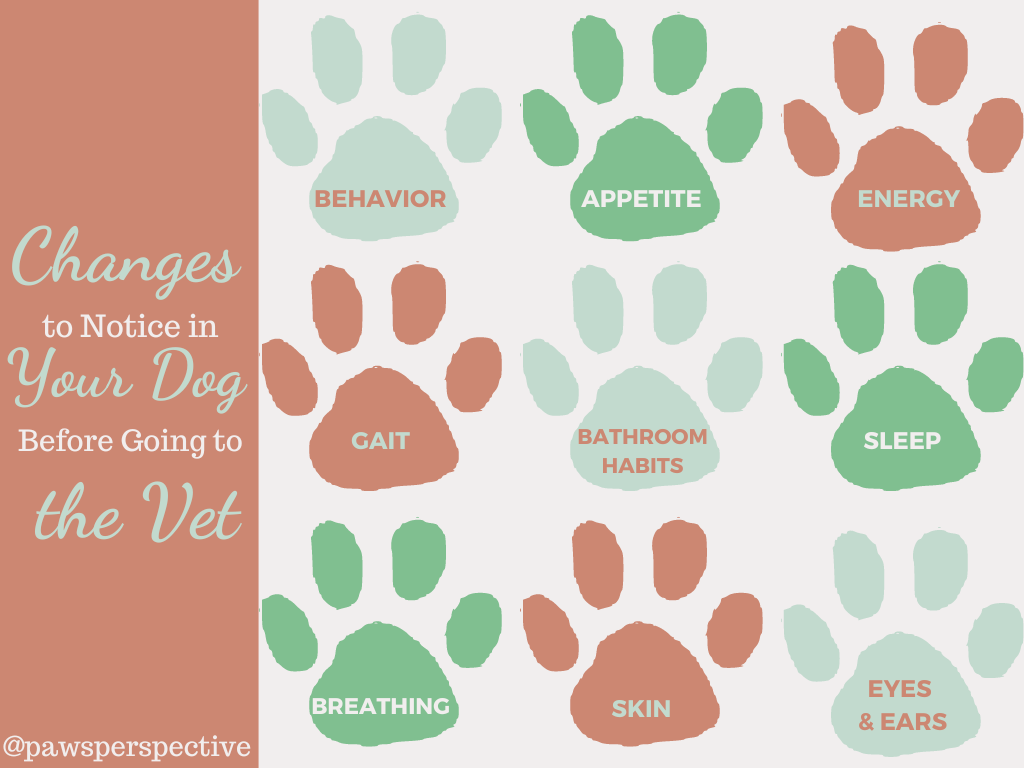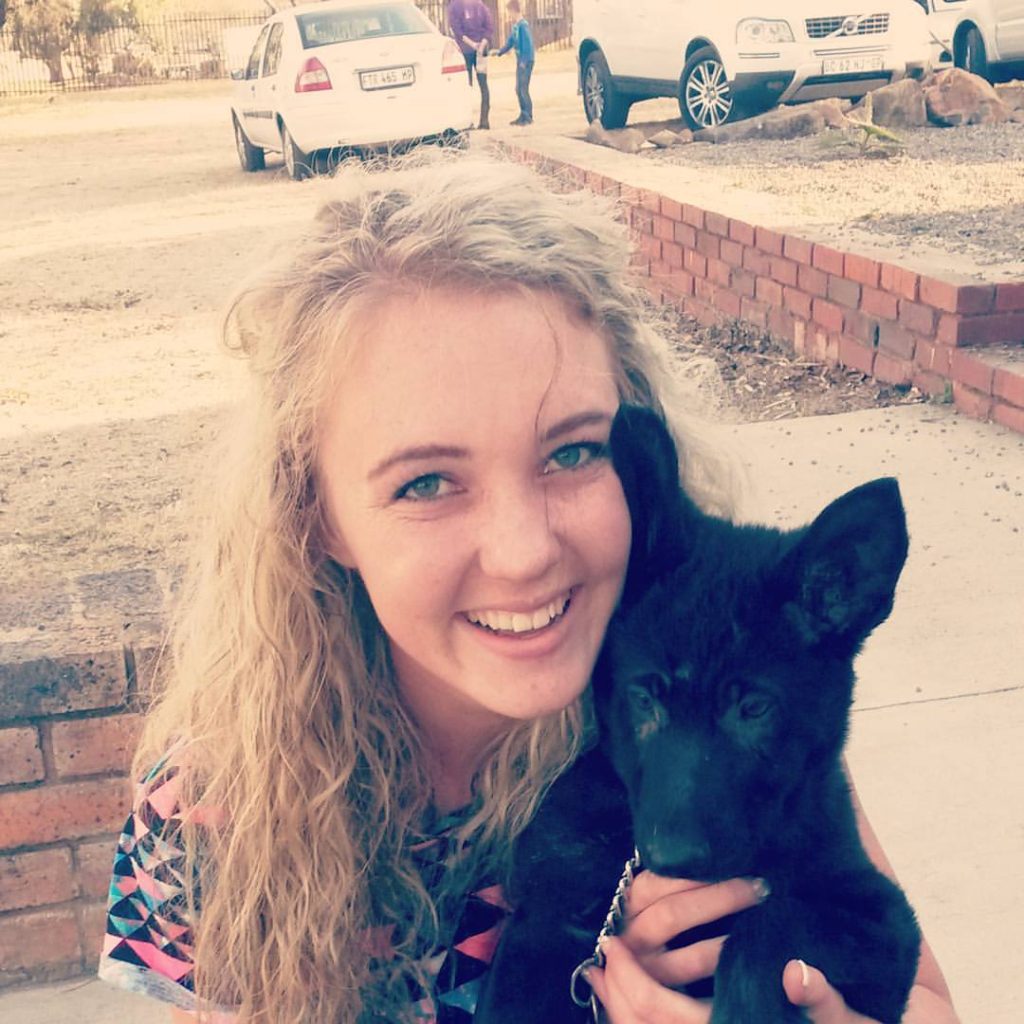Taking your dog to the vet can be a stressful experience. Whether you’re just going for a routine check-up or your dog’s not feeling well. On top of all this, you have to answer questions your vet asks, whether you know how to answer them or not.
I’ve had a few unfortunate vet visits where I had to take really sick dogs to the vet. I noticed that the vets’ types of questions were almost always the same no matter which practice I went to. If I couldn’t answer these questions, the vets would have found it more challenging to get to the root of these illnesses.
The common questions a vet will ask you are:
(click on each question to jump to the section)
- What is the Reason for Your Visit?
- How Has Your Dog Changed? (Behavioral, Appetite, Energy Levels, Etc)
- When Did These Changes Start, and How Long Did They Last?
- What Do You Feed Your Dog and When Do You Do It?
- What Medications or Supplements Do You Give Your Dog?
- Are Your Dog’s Vaccinations Up to Date?
- Do Your Dog Regularly Get Deworming and Tick and Flea Prevention?
- What Grooming Practices Do You Perform on Your Dog?
- How Often Does Your Dog Go to Public Places?

So, before I go to the vet, I will answer these questions in my head so that I’m prepared when the vet asks me. Often, we can get so overwhelmed or emotional during a vet visit that it helps to answer these questions before the visit itself. Because you rehearsed it, you won’t forget some of the detail while you’re overwhelmed or anxious in the examination room.
Why Your Vet Asks You Questions
These questions aren’t random. It helps your vet figure out what illness, injury, or situation they’re dealing with and how to help the dogs to the best of their abilities. It’s a way of getting to know the dog and its environment, routines, exposure, and risk factors.
Vets ask dog owners questions to get an accurate diagnosis and treatment plan.
The better the owner can answer the questions, the better the vets can help the dogs. I know; it sounds obvious. But it’s not something everyone thinks about. I didn’t know about vet questions the first time I took my sick dog to the vet. I didn’t know exactly how to answer because I didn’t observe my dog closely enough.
The Importance of Your Vet Asking Questions
You know that your vet will ask you a few questions, but what is the real reason for being bombarded with a long list full? Well, the University of Lincoln in the United Kingdom did a study where they found that 89% of pet owners and vets share three main themes they deem essential in vet care:
- Understanding each other: Proper information sharing so the owner and vet can form part of the same team with the same goal.
- Information specifically for the dog and owner: The vet provides the correct information to the owner regarding the dog’s specific problems in a way they can understand.
- Informed decision-making: The owner understands all information and has options to make the best final decision for the dog.
So, these questions will help you, and your vet work together to create the best possible outcome for your dog!
The Questions Your Vet Should Ask You
The more I take dogs to the vet, the more I realize that these questions are pretty straightforward. So, if you know that the vet will ask these questions every time, you’ll improve how you observe your dogs throughout their lives. But exactly why do they ask these questions? Let’s have a look.
What is the Reason for Your Visit?
The reason for your vet visit is the first question your vet would ask you. It helps navigate the rest of the session and the questions that follow. The common reasons people take their dogs to the vet are:
- Routine annual check-up
- To get vaccinated
- To get a tick, flea, and worm prevention
- Because the dog is sick
- Because the dog had an injury
- Changes in appetite and water drinking habits
- Drastic behavioral changes
- Changes in bathroom habits
If you can state the reason for your visit clearly, it helps to save time and give accurate information to the vet about your dog’s health and history.
These reasons above are just some of the common reasons. Remember that you know your dog better than anyone, and you are their voice. If you notice changes that worry you, take your dog to the vet as soon as possible.
How Has Your Dog Changed? Are These Changes Behavioral, Appetite, Energy Levels, Etc?
Any drastic changes in your dog can indicate that something is wrong. That’s because each disease or injury can manifest differently, causing your dog to change.
You know your dog’s behavior and routine the best, so be sure to observe them every day. This way, you can quickly notice if something is off with your fur friend. It doesn’t mean you should take your dog to the vet for every minor change, only those that concern you.
Once the vet knows about these changes, they can start to pinpoint where the issue might be. Let’s look at the type of behavioral changes your dog might go through:

Your Dog Has Behavioral Changes
Behavioral changes refer to your dog not acting the way they usually do. Any change in your dog’s usual behavior is good evidence that might help the vet’s diagnosis. For instance, is your dog typically friendly and relaxed but more agitated and aggressive? Are they barking more than usual? Are they less interested in certain situations than they usually are?
Your Dog Has Changes in Appetite
You know how much your dog usually eats and drinks water. If this changes, your vet should know. For instance, are your dog eating less or more than usual? Or does your dog drink more or less water than usual?
Your Dog Has Changes in Energy Levels
Dogs typically have less energy as they grow older, but that doesn’t change suddenly. Take note of any sudden changes in your dog’s energy levels. For instance, is your dog usually passive but started running around the house like a maniac? Or is your dog usually active and suddenly sleeps most of the day?
Your Dog Has Changes in How they Walk
If the way a dog walks (their gait) changes, it can indicate underlying conditions. These conditions could be hip dysplasia, injuries, or something as simple as nails being too long. So, does your dog limp? If so, in which leg is it continuous or on-an-off? Is your dog not walking straight but leaning slightly? Or does your dog walk into items they’ve been able to avoid their whole life?
Your Dog Has Bathroom Habits Changes
A dog’s bathroom habits can fluctuate naturally depending on what they drank, ate, or environments they’ve been exposed to, like murky water. These changes can be not defecating enough or having diarrhea. It can also be urinating more or less than usual. So, keep tabs on your dog’s bathroom habits. Notice whether it changed and if those changes are justifiable. But, if these changes typically last longer than three days, it may be time to consult a vet.
Your Dog Has Sleeping Pattern Changes
Dogs typically sleep 12-14 hours a day. Some might sleep more and some less. But you already have an idea about how much your dog sleeps. So, if your dog suddenly starts sleeping more or less than their usual duration, it might mean something is up, and your vet should know about it.
Your Dog Has Breathing Changes
Some dogs naturally breathe louder than others, mainly breeds with short snouts. But consider whether those breeding patterns change. For instance, does your dog breathe louder than usual? Does it sound like they’re struggling to take a breath? Do they pant more than usual? Are their breaths deeper or more shallow than it typically is?
Your Dog Has Skin Condition Changes
A dog’s skin is something owners don’t necessarily see or notice every day. But it can be helpful to observe the skin regularly to notice any changes. For instance, is the skin flaky, red, or swollen? Or are there cuts and bruises under the fur? Do your dogs scratch or lick certain areas of their bodies more than usual?
Your Dog Has Changes in the Eyes or Ears
While a dog’s eyes and ears are essential to navigating their environments, these parts get exposed to environmental elements. Then, they get irritated and can cause health issues like infections. Remember that some dogs’ eyes are naturally teary, and some’s ears are naturally moister. So think about how your dog’s eyes and ears usually look.
For instance, think about the eyes: Are their eyes more or less teary than usual? Do the eyes seem dry? Does your dog scratch at the eyes a lot? Are the eyes red or swollen? Is there unusual white covering the eye or a red bulge in the inner corner of the eye?
On the other hand, think about the ears: are they red and swollen? Do they smell bad? Are there brown flecks or yellow discharge in the ears? Does your dog shake their head vigorously during the day (this could mean they have an ear infection)?
When Did These Changes Start, and How Long Did They Last?
Now that you’ve noticed the type of changes your dog experienced, the vet would like to know when these changes started and how long they last. These changes, starting point, and duration can help them narrow down a range of possible diagnoses.
I got the best advice to pen these changes down with dates, times, and specific characteristics. This documentation will help you remember exactly when your dog started acting abnormally, giving more accurate information to the vet.
What Do You Feed Your Dog and When Do You Do It?
What a dog eats and when they eat can directly influence their health. Some dogs can develop sudden allergies, and others might become intolerant of some ingredients. So, the vet must know what you feed your dog daily.
This information includes their meals and the treats and snacks they get. And be honest about whether you give table scraps. It doesn’t make you a bad dog owner. In fact, it makes you an excellent one for telling the vet the truth about your dog’s eating habits.
When your dog eats can also make a difference in the diagnosis. For instance, if your dog eats a full meal before going for a run on the beach, their stomachs can twist and cause a fatal condition named Gastric Dilatation Volvulus (GVD).
What Medications or Supplements Do You Give Your Dog?
When it comes to medications and supplements, not every dog will react the same way to all of them. Each medicine has different side effects that can either occur to the dog taking it or not. Some of these side effects can be bad enough to sicken your dog, so your vet should know what you give your dog.
Don’t worry if you’re unsure or don’t remember the fancy names well. You can take the medication bottles with you; it’s one less thing to remember.
Are Your Dog’s Vaccinations Up to Date?
Whether you believe in vaccinating your dogs or not, it’s still something the vet should know. Most of the diseases the vaccines protect dogs against can spread quickly and cause nearly fatal diseases. So, if your dog isn’t vaccinated, one of these diseases could have entered their body.
On the other hand, if your dog recently got a round of vaccines, they might cause adverse reactions affecting your dog’s health. If this is the case, it’s essential for your vet to know so they can report these reactions to the manufacturer of those vaccines.
If you’re still not sure whether you should vaccinate your dog, we list the pros and cons in this linked article.
Do Your Dog Regularly Get Deworming and Tick and Flea Prevention?
Some pests can affect your dog’s health, and medications to keep these pests at bay are necessary. Pests like ticks, fleas, and worms can make dogs sick. Vets usually recommend that you give preventative medication to avoid these pests negatively affecting your dog’s health.
Your vet would like to know if you give your dogs baths with special tick and flea prevention shampoo, preventative tablets (like Bravecto), and deworming tablets.
Some people live in areas where these medications might not be necessary. But if they travel to public places, go with you to different holiday destinations, or get in contact with other dogs, these pests can get in contact with the dogs.
Some pests are not as harmful, but others can have dire effects on your dog.
What Grooming Practices Do You Perform on Your Dog?
How you groom your dog, where you groom your dog, and what body parts you groom can also affect your dog’s health. Some people forget to clean a dog’s ears, wipe off tear stains, clip the dog’s nails, comb out mats, or clean their teeth.
You don’t necessarily have to clean each body part every time your dog takes a bath. But neglecting certain areas for a long time can cause health issues. One of the most common examples is dogs getting ear infections because their owners didn’t dry their ears after swimming.
Where you groom your dog makes a difference as well. For instance, I had an experience once where I took my Cocker Spaniel (Dixie) to the groomer for her first birthday. I’m almost embarrassed to mention this, but I was two weeks late with her tick and flea prevention tablets. So, when she returned from the groomer, she had a humungous tick stuck to her neck.
How Often Does Your Dog Go to Public Places?
If your dog is typically healthy at home, the chances are that there are no bacteria, viruses, or pests living in your home or yard that can harm your dog. Unfortunately, these changes drastically increase if you take your dog to public places.
So, tell your vet whether you take your dog to the dog park, doggie daycare, or play dates. It might be that another dog was sick without the owner noticing, allowing the illness to spread to the other dogs around.
A typical example is kennel cough spreading like wildfire through a doggie daycare. It is a respiratory disease that spreads quickly from one dog to another. That’s why most doggie daycares or overnight shelters require dogs to get their kennel cough inoculations because they are close.

The Paws Perspective
The amount and type of questions vets usually ask dog owners might sound overwhelming, but don’t worry! You’ll get the hang of it the more you experience vet visits. You’ll even become a pro at recognizing your dog’s health changes and how to give detailed answers to your vet’s questions.
Just remember that you know your dog best. So, if you keep an eye on them every day, noticing their usual behavior, you’ll see unusual ones quickly. Not only can you then prevent minor issues from escalating, but you can also provide your vet with the best information to make an accurate diagnosis!
